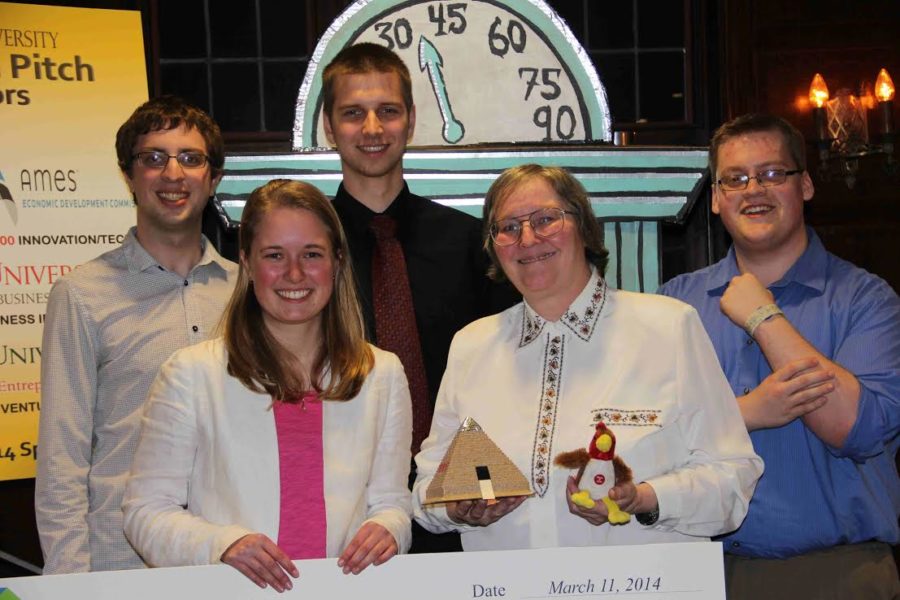Students medal at innovation contest: entrepreneurs earn money for business pitches
Shaun VanweeldenCQ, Janet HorsagerCQ, Michael NoskoCQ, Eve IversenCQ and Jared BeymerCQ received awards at the Innovation Pitch Competition on March 11.
April 3, 2014
Technologically advanced winter wear, a beehive rental service, a book return service, interactive medical wristband technology and an innovative chicken coop were the winners of a 90-second “elevator pitch” contest for business concepts.
Judges heard these pitches at the Entrepreneurship and Innovation Learning Community’s Innovation Pitch Competition.
Cash prizes sponsored by area entrepreneurs and businesses were awarded to winners of five categories: best overall pitch, best new innovation or technology, best new business idea, best new social venture and audience choice.
“It’s a ton of fun hearing what people around you are working on and getting feedback about your own ideas,” said Shaun Vanweelden, senior in software engineering and winner of $300 and the best new business award.
Judi Eyles of the Pappajohn Center for Entrepreneurship and leader of the Entrepreneurship and Innovation Learning Community said the pitch allows students to practice their presentation skills. It is also an opportunity for participants to see if their concepts spark interest.
“It was tough for the judges, which means the pitches were good,” Eyles said.
Janet Horsager, senior in economics, said she thought the competition would be a great public speaking opportunity in a safe environment.
Horsager won $500 for the best overall pitch for an idea that stemmed from her family’s beekeeping hobby. Her concept combats colony collapses in beekeeping by bringing beehives into urban settings in residential gardens. The company would provide the hives, maintain the bees and harvest the honey.
Horsager was stunned when it was announced that she had won.
“I just wanted some experience,” she said. “I did not expect to win.”
Dave Sly, lecturer of industrial and manufacturing systems engineering and one of the judges, started his first company as an undergraduate and then started another company called Proplanner during graduate school, which he is still running. He has never been to a job interview or worked for a company after he started his own.
Sly said the judges are available as mentors for students who are wanting to start a business.
“As a student who started a company,” Sly said, “I am pretty personally engaged in helping other students go through the same thing.”
Michael Nosko, senior in industrial engineering, is one such student who said that he hopes to create his own business. He won $500 and the audience choice award for his concept of thin plastic insulation for winter wear.
Nosko said that the award and positive feedback gave him a boost of confidence that his business plan has potential.
“When you are with people who have no vested interest in your feelings, it is a great way to see if your ideas hold weight,” Nosko said.
Jared Beymer, junior in management information systems and peer mentor for the Entrepreneurial and Innovation Learning Community, took home $300 from the best new innovation or technology category for his interactive medical wristband technology concept.
Beymer has been an entrepreneur since he started developing a card game similar to “Yu-Gi-Oh!” with a neighborhood friend in elementary school because they could not afford “Yu-Gi-Oh!” cards. They sold the cards at school, and he said that they became more popular than the original game for students at his school.
“Then I just caved in and started buying “Yu-Gi-Oh!” cards with the money I was making,” Beymer said.
Eve Iversen, a graduate student in natural resource ecology and management, won $300 in the best new social venture category for her innovative chicken coop concept. She said the pitch was a real-world extension of her sustainable agriculture doctorate program and that she has invested the prize money in continuing her plan.
“I think more students should enter the Pitch Competition,” Iversen said. “It’s a great opportunity to distill your great idea into a compelling 90 seconds.”
Eyles said that summer is a good time for students to work on entrepreneurial ventures. People looking for help with their business concepts can make an appointment with the Pappajohn Center for Entrepreneurship. The center offers assistance in planning, prioritizing and validating that there is a market for the idea. She said that they try to make the process less risky and overwhelming.
“The whole idea is to help students feel comfortable pursuing their ideas,” Eyles said. “If they have a good one and have the energy to put into it, we’ll help them get there.”







